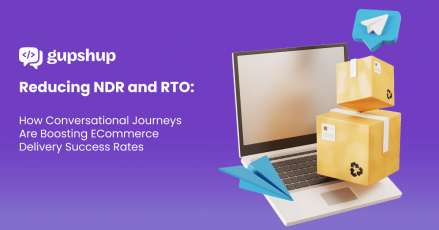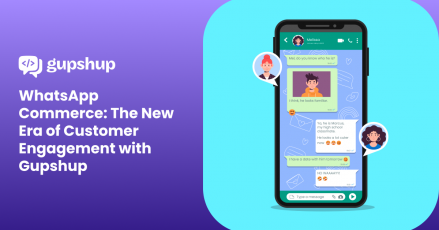What is RCS Messaging and How It Can Boost Brand Engagement?

Introduction
When people think of mobile messaging, they often think of SMS, a technology that has been around since the 1990s. However, Rich Communication Services (RCS) is changing the game by adding a new layer of interactivity and media richness to our text messages. RCS messaging was developed by the GSM Association (GSMA) to overcome the limitations of traditional SMS. Launched in 2008, RCS aimed to provide a more feature-rich messaging experience, similar to popular messaging apps like WhatsApp Business API.
By integrating features such as high-resolution photo sharing, read receipts, typing indicators, and interactive buttons, RCS services bring a more dynamic and engaging form of communication to users’ native messaging apps. In fact, over the years, RCS has been used widely across the world, with 800 million monthly users!
Conversations with Google RCS for business highlight how brands can leverage these features to enhance customer interactions and drive engagement. This article will delve into the details of what RCS is, its features, and how it will help boost engagement for businesses to stay ahead of the competition.

What is RCS Messaging?

RCS services or Rich Communication Services is a communication protocol designed to enhance traditional SMS and MMS messaging. It provides a richer, more interactive messaging experience compared to other forms of mobile communication.
While SMS is limited to 160 characters and MMS allows for limited media sharing, RCS takes it one step further. It provides a comprehensive messaging experience that combines text, media, and interactive elements. This makes RCS API a powerful tool for both personal and business communication.
Companies can use RCS for a variety of purposes, including customer support, marketing campaigns, and transactional messaging. The ability to verify sender identities adds an extra layer of security and trust, making customers more likely to engage with RCS messaging.
Difference Between SMS and RCS Services

Benefits of RCS Business Messaging: Transforming Business Communication

RCS offers enhanced features that boost customer engagement, improve customer experience, provide valuable data insights, and build brand trust. Here’s a detailed look at how RCS transforms business communication:
1. Boosting Engagement with Rich Media
RCS messaging supports the sharing of high-resolution images, videos, GIFs, and interactive elements like carousels and buttons. This capability allows businesses to create visually appealing and engaging messages that capture customer attention and drive higher engagement rates.
For instance, a retail brand can send promotional messages with embedded product images and direct purchase buttons, streamlining the shopping experience within the messaging app itself.
2. Enhancing Customer Experience
RCS business messaging provides a seamless and interactive messaging experience, which significantly enhances customer satisfaction. Features like read receipts, typing indicators, and real-time responses improve communication transparency and efficiency.
Businesses can use RCS to offer personalized and immediate customer support, such as sending order confirmations, delivery updates, and interactive troubleshooting guides, thereby enhancing the overall customer experience.
3. Data-Driven Insights
RCS services allow businesses to gather and analyze detailed insights from customer interactions. With advanced analytics, companies can track metrics such as read rates, response times, and engagement levels.
This data helps businesses refine communication strategies, tailor messages to customer preferences, and improve overall campaign effectiveness. By understanding customer behaviors and preferences, businesses can create more targeted and impactful marketing campaigns.
4. Building Brand Trust
The verified sender feature in RCS business messaging ensures that messages come from authenticated sources, which builds trust with customers. Verified business profiles can include logos, brand colors, and contact details, making it easy for customers to recognize and trust the sender.
Enhanced security features, including end-to-end encryption, protect customer data and further build confidence in the communication channel. This trust encourages customers to engage more readily with the brand, knowing their interactions are secure and authentic.

How RCS Business Messaging Works?

RCS messaging leverages both mobile data and Wi-Fi to transmit messages, enhancing the traditional SMS experience with richer features. Unlike SMS, which relies on cellular networks, RCS uses the internet to deliver messages, enabling the inclusion of high-quality multimedia content such as images, videos, and interactive elements.
When an RCS message is sent, it travels over the internet via a data connection or Wi-Fi, allowing for real-time communication features like read receipts and typing indicators. If a device is connected to Wi-Fi, RCS messages will utilize that connection; otherwise, it will use the mobile data network (4G, 5G) to ensure message delivery.
This internet-based approach allows the RCS API to support a richer set of features compared to the limited capabilities of SMS, which is restricted to text and basic media attachments due to its reliance on the older signaling network.
Major Carriers and Devices Supporting RCS Technology
RCS is supported by many major carriers and devices globally, particularly within the Android ecosystem. Key carriers like Verizon, AT&T, T-Mobile, and Sprint in the United States have implemented RCS support, making it available on a wide range of Android devices. Google Messages and Samsung Messages are the primary apps that facilitate RCS messaging on these devices, offering a seamless and integrated messaging experience.
The rollout of RCS has been extensive, with operators in countries like Germany, the UK, France, and Japan also supporting the protocol. This broad adoption means that users in these regions can experience the advanced features of RCS, provided they have compatible devices and network support.
However, it’s important to note that while RCS is predominantly available on Android devices, Apple announced that it would support RCS in its iOS 18 update, which is expected to roll out soon. This expansion to iOS will further enhance the reach and interoperability of RCS messaging.
How Does RCS Business Messaging Boost Brand Engagement?

RCS is transforming how businesses engage with customers by providing advanced messaging features that go beyond traditional SMS.
Let’s look at a few examples of how RCS can be helpful in different industries:
RCS for Industries
RCS is particularly beneficial for several industries, offering tailored solutions to enhance customer engagement and streamline operations:
1. Retail
Retailers can use RCS messaging to send personalized offers, product recommendations, and promotional messages with rich media. This creates an immersive shopping experience and drives sales.
2. Finance
Financial institutions can leverage RCS messaging to provide secure and efficient customer support. RCS allows for real-time updates on account balances, transaction notifications, and secure authentication processes directly within the messaging app. This enhances convenience and security for customers managing their finances.
3. Travel and Hospitality
Travel and hospitality companies can use RCS to simplify booking processes, provide real-time updates, and offer personalized recommendations. Customers can book flights, reserve hotel rooms, and get travel updates all within the messaging app. This streamlines the travel planning process and enhances the overall customer experience.

How to Implement RCS Messaging in your Marketing Strategy
Implementing RCS in your marketing strategy can significantly enhance customer engagement by leveraging multimedia and interactive capabilities that traditional SMS cannot provide.
Here’s how you can effectively integrate RCS into your marketing efforts:
1. Understand the Benefits of RCS Services
RCS messaging goes beyond SMS by enabling businesses to send rich media messages that include images, videos, and interactive buttons. This makes it easier to create engaging and personalized conversations with customers, similar to app-like experiences directly within their messaging apps.
2. Define Clear Objectives
Before implementing RCS API, it’s crucial to set clear objectives. Determine whether you aim to increase sales, enhance customer engagement, or improve customer support. These objectives will guide your strategy and help you measure the success of your campaigns.
3. Segment Your Audience
Segmenting your audience based on demographics, shopping habits, or preferences can help you tailor your messages more effectively. Personalized messages resonate better and can lead to higher engagement rates. For instance, sending location-based promotions with RCS business messaging can drive foot traffic to physical stores.
4. Create Engaging and Personalized Content
Use the rich media capabilities of RCS to craft compelling messages. Incorporate images, videos, carousels, and interactive buttons to capture attention. For example, you can use RCS business messaging to send personalized product recommendations based on past purchases or browsing history.
5. Ensure Security and Compliance
It’s important to comply with data protection regulations such as GDPR (General Data Protection Regulation). Ensure that your RCS messaging platform provider has robust security measures in place, including encryption and multi-factor authentication, to protect customer data.
6. Integrate RCS with Existing Systems
Ensure that your RCS messaging is fully integrated with your CRM, customer support, and marketing systems. This integration allows for seamless data flow and a unified customer experience. Partner with experienced providers to facilitate this process and ensure compatibility.
7. Utilize Gupshup’s Capabilities
Gupshup can significantly enhance your RCS implementation. It supports rich media messaging, interactive chatbots, and seamless fallback to SMS, ensuring your messages reach all customers regardless of their device’s RCS support. Gupshup’s analytics tools can help track engagement and optimize campaigns.
Conclusion
As we move into the future of mobile messaging, RCS stands out as a transformative technology that enhances customer engagement and brand communication. With its ability to deliver rich media, interactive elements, and verified sender profiles, RCS provides businesses with powerful tools to create immersive and personalized customer experiences.
The integration of RCS with platforms like Gupshup further amplifies these capabilities, ensuring robust security, seamless fallback to SMS, and comprehensive analytics to optimize campaign performance.
As adoption grows and technology evolves, leveraging RCS in your marketing strategy will keep your brand competitive and foster deeper connections with your audience, driving engagement and loyalty. Connect with us.
Frequently Asked Questions (FAQ)
What is RCS messaging?
Rich Communication Services (RCS) is a communication protocol designed to upgrade SMS by enabling features such as high-resolution photo sharing, read receipts, typing indicators, and interactive buttons, offering a richer and more dynamic messaging experience directly in users’ native messaging apps.
What is RCS marketing?
RCS marketing leverages Rich Communication Services to enhance customer engagement by sending interactive and multimedia-rich messages, including images, videos, and action buttons, directly to consumers’ native messaging apps. This enables businesses to create personalized, engaging marketing campaigns that drive higher interaction and conversion rates.
What are the advantages of RCS messaging?
RCS messaging offers several advantages: enhanced media sharing (images, videos), interactive elements (buttons, carousels), verified sender profiles for security, SMS fallback for universal reach, and detailed analytics for campaign optimization. These features enable more engaging, secure, and effective customer communication.




